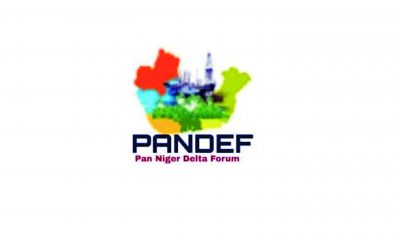Health
Physician Warns Against Self-Medication
A consultant physician at the National Hospital, Abuja, Dr Oluwagbenga Ogunfowokan, has advised the public against taking drugs not prescribed by a doctor or risk Adverse Drug Reaction (ADR).
Dr Ogunfowokan explained that many Nigerians formed the habit of abusing drugs which could have adverse effect in the liver and kidney later.
ADR refers to any harm associated with the use of given medications at a normal dose during normal use or taking overdose.
“Drugs are beneficial but can also be dangerous. They should not just take any drug or buy any drug that a well-qualified doctor has not prescribed otherwise they may not see the immediate danger.
“But some of those drugs may be destroying their kidney and liver and maybe after five, 10, 15 years that those serious damage would now manifest.
“Once the drug is not used as prescribed then the drug is being abused, and you can have toxicity of the drugs and a lot of side effects of the drugs.
“Even when a drug is prescribed and someone takes the drug as prescribed there are well-known side effects of some drugs.
“For people that abuse drugs, just buying them may be for pain or headache and they use them over a long time, they actually need to be sure that their doctors have recommended those drugs for them, otherwise it might be dangerous.”
Ogunfowokan said it was the duty of the doctor or pharmacist to find out from a patient if they were allergic to a particular drug before prescribing it.
He said that if a patient was not allergic to a drug, the doctor could prescribe such drug for the patient.
“If the person has no allergic reaction to the drug, the doctor and the pharmacists would have educated the patient that there are other side effects other people have experienced, which they should look out for.
“So if such side effects are well known there is no problem except the side effect is exaggerated.”
He, however, said that if a patient was taking a particular drug for the first time, it would be important for the doctor to educate him or her on its side effects.
“If a patient has never taken a drug before definitely the patient would not know whether he or she reacts to that drug.
“So what we say when you are taking any drug, if you feel that your body is not accepting the drug you report to the doctor and the doctor will now make sure you do not have that type of drug again.
The doctor also advised pregnant women to ensure that they took only drugs prescribed by a doctor.
“Sometimes because somebody is pregnant you don’t know how the baby inside will respond to that drug so you want to make sure that the drug you are using and has been well tested and has been found to be very safe.
He said that some of the commonly abused drugs included paracetamol and caffeine.
Health
‘How Micro RNA Research Won Nobel Prize’
Two United States scientists who unraveled the human micro RNA have won the Nobel Prize in Physiology or Medicine 2024.
Victor Ambros and Gary Ruvkun won the coveted prize for their work on microRNA as their discoveries help explain how complex life emerged on earth and how the human body is made up of a wide variety of different tissues.
MicroRNAs influence how genes – the instructions for life – are controlled inside organisms, including humans.
Every cell in the human body contains the same raw genetic information, locked in our DNA.
However, despite starting with the identical genetic information, the cells of the human body are wildly different in form and function.
The electrical impulses of nerve cells are distinct from the rhythmic beating of heart cells. The metabolic powerhouse that is a liver cell is distinct to a kidney cell, which filters urea out of the blood.
The light-sensing abilities of cells in the retina are different in skillset to white blood cells that produce antibodies to fight infection.
So much variety can arise from the same starting material because of gene expression.
The US scientists were the first to discover microRNAs and how they exerted control on how genes are expressed differently in different tissues.
The medicine and physiology prize winners are selected by the Nobel Assembly of Sweden’s Karolinska Institute.
They said: “Their groundbreaking discovery revealed a completely new principle of gene regulation that turned out to be essential for multicellular organisms, including humans.
“It is now known that the human genome codes for over 1,000 microRNAs.”
Health
WHO Begins Regulation On Antibiotic Waste
The World Health Organisation (WHO) has begun acting to curb effects of antibiotic pollution.
The new guidance on wastewater and solid waste management for antibiotic manufacturing sheds light on this important but neglected challenge ahead of the United Nations General Assembly (UNGA) High-Level Meeting on antimicrobial resistance (AMR) taking place on 26 September 2024.
The emergence and spread of AMR caused by antibiotic pollution could undermine the effectiveness of antibiotics globally, including the medicines produced at the manufacturing sites responsible for the pollution.
Despite high antibiotic pollution levels being widely documented, the issue is largely unregulated and quality assurance criteria typically do not address environmental emissions. In addition, once distributed, there is a lack of information provided to consumers on how to dispose of antibiotics when they are not used, for example, when they expire or when a course is finished but there is still antibiotic left over.
“Pharmaceutical waste from antibiotic manufacturing can facilitate the emergence of new drug-resistant bacteria, which can spread globally and threaten our health. Controlling pollution from antibiotic production contributes to keeping these life-saving medicines effective for everyone,” said Dr Yukiko Nakatani, WHO Assistant Director-General for AMR ad interim.
Globally, there is a lack of accessible information on the environmental damage caused by manufacturing of medicines.
“The guidance provides an independent and impartial scientific basis for regulators, procurers, inspectors, and industry themselves to include robust antibiotic pollution control in their standards,” said Dr Maria Neira, Director, Department of Environment, Climate Change and Health, WHO. “Critically, the strong focus on transparency will equip buyers, investors and the general public to make decisions that account for manufacturers’ efforts to control antibiotic pollution.”
Health
Kebbi Harmonises Doctors’ Salaries To Curb Brain Drain
In a concerted effort to curb brain drain, the Kebbi State Government has harmonised medical doctors’ salaries to be at par with their colleagues in the federal government’s tertiary health facilities.
Kebbi State Commissioner for Health, Musa Inusa-Isma’il, disclosed this at the handing over of ambulances to the state-owned health facilities at the Ministry of Health in Birnin Kebbi yesterday.
Inusa Isma’il, according to a statement by Ahmed Idris, the Chief Press Secretary to the governor, said the essence of the harmonisation was to retain the existing medical doctors and attract more to the services of the state.
According to him, the doctors across the state had already started enjoying the new salaries from August 2024.
He said the release of the vehicles was in fulfilment of Governor Nasir Idris’ promise to uplift health care services in the state.
“His Excellency said I should inform you, the beneficiaries of this gesture, that the vehicle should be strictly used for the intended purpose. It should not be used for anything else.
“If there is no referral case, each of the vehicles must be parked at the hospital by 6 pm. The governor said you should warn your drivers against reckless driving as well as violating the instructions.
“We should also do everything possible to reciprocate the gesture by working according to the terms and conditions attached,” he advised.
The benefiting health facilities included Sir Yahaya Memorial Hospital, Birnin Kebbi; State Teaching Hospital, Kalgo; General Hospital, Argungu; General Hospital, Yauri; General Hospital, Zuru; and General Hospital, Bunza.
In his speech, the permanent secretary of the ministry, Dr Shehu Koko, recalled that the ambulances were handed over to the ministry last Friday by the governor for the onward handover to the benefiting hospitals.
He observed that the ambulances would go a long way in improving the referral system in the state, adding that delays in reaching the secondary and tertiary facilities would be eliminated.
The permanent secretary attributed the high rate of maternal mortality in the country to delays in getting to the health facilities for proper medical care.
“We believe with the provision of these ambulances, part of the gaps we have in our referral system will be addressed, whereby patients who require secondary healthcare could be easily transported to secondary and tertiary health centres, where they can get such help,” he said.
In a goodwill message, Commissioner for Information and Culture Alhaji Yakubu Ahmed expressed gratitude to the governor for the support he has given to the ministry to excel.
While advising the beneficiaries to use the vehicles judiciously, the commissioner advised that services and maintenance of the vehicles must be prompt to derive the maximum benefits from the vehicles.
The commissioner also highlighted some achievements recorded by the government in the last year, including beautification of the state capital, completion of a multimillion-naira ultramodern state secretariat, road construction, construction and renovation of classrooms and upgrading of some health facilities, among others.
-
Sports5 days ago
NPFL : Finidi Optimistic To Get Three Points In Uyo
-
Politics5 days ago
100 Days In Office: Lawmaker Passes Confidence Vote On Council Boss
-

 News5 days ago
News5 days agoWhy We Need S’South Dev Commission – Sara Igbe
-
Business5 days ago
NCS Hands Over Intercepted Arms To NCCSALW
-

 News5 days ago
News5 days agoFubara Graces Agric Commissioner’s Wedding At Ciwa
-
Sports5 days ago
‘Don’t Rely Too Much On NCAA Athletes’
-
Politics5 days ago
PDP, APC Trade Blame Over Killings In Osun Local Councils’ Crisis
-
News5 days ago
‘We’ll Upscale Education Infrastructure To Advance Learning In Rivers’

